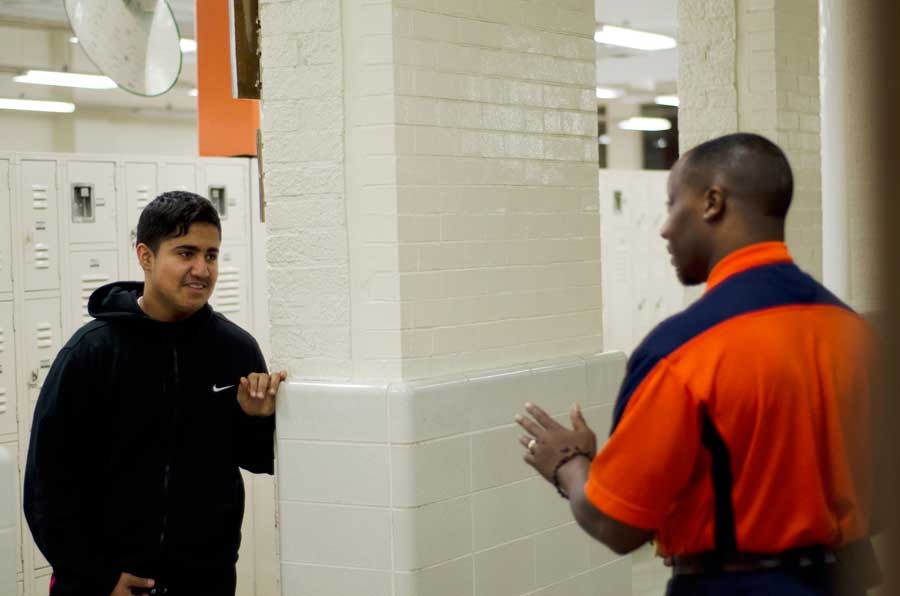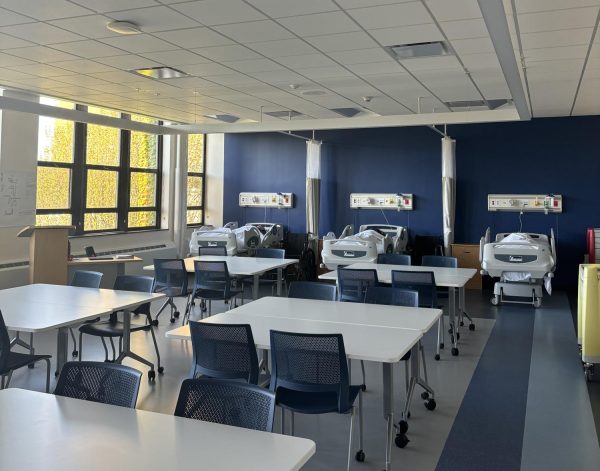Safety works to stop theft in locker rooms
You’ve heard the stories. People say that it seems like a phone or a pair of shoes goes missing in the locker room everyday, but it turns out theft at ETHS might be less of a problem than you think.
“The vast majority of thefts happen because of carelessness,” said Bobby Locke, head of security in the boys locker room. “I’ve only had to file around four stolen property reports so far this year.”
When items are stolen, students report to Safety, who fill out an incident report and conduct a search of the four locker rooms.
Safety also keeps an online log of every theft, open locker and missing item.
Despite the thorough system, students have plenty of stories about their missing items. “My backpack was stolen sophomore year,” said Maya Mayajar, junior. “A day later, it was found in a garbage can.”
Mayajar didn’t wait until her lock clicked, a common mistake.
“I walk past lockers all the time with the locks just hanging down,” said Locke.
Another problem arises from close locker assignments. With students in close proximity to each other, it becomes much easier for students to see classmates use their locker.
“Some kids are opportunists, so if they see someone not paying attention, they’re going to take advantage of it,” added Locke.
Sharing lockers is another huge issue. Many students question why the practice is banned, but it is one of the leading causes of stolen property.
For example, last year there was an occasion when $40 was stolen from a locker being shared between three boys. When none of them admitted to taking the money, Locke had to send them to the dean.
Still, it’s hard for students like junior Natalie Lovinger, whose debit card was stolen this year, to imagine classmates stealing. “All of the people who are in my gym row are nice and honest. I don’t know who it would be,” she said.
In the end, Safety wants it to be known that students mostly have control of whether or not their items get stolen. “Young people don’t like being wrong, and they don’t like being held accountable, and that makes me the bad guy. I just want to work with kids so that these thefts can be prevented.”
Your donation will support the student journalists of the Evanstonian. We are planning a big trip to the Journalism Educators Association conference in Philadelphia in November 2023, and any support will go towards making that trip a reality. Contributions will appear as a charge from SNOSite. Donations are NOT tax-deductible.











falcon • Apr 28, 2016 at 11:53 pm
This becomes a pretty interesting article after the release of the videos. Hen house, I think you’ve found your fox.
I hope these kids didn’t actually get in trouble:
>For example, last year there was an occasion when $40 was stolen from a locker being shared between three boys. When none of them admitted to taking the money, Locke had to send them to the dean.
Griffin Daniel Gallas • Apr 28, 2016 at 11:35 pm
all of the security guards suck -griff
ShanahanK • Apr 28, 2016 at 9:09 pm
It turns out coach Locke was the one stealing the stuff the whole time
Katie • Apr 28, 2016 at 11:28 am
In the end, Safety wants it to be known that students mostly have control of whether or not their items get stolen. “Young people don’t like being wrong, and they don’t like being held accountable, and that makes me the bad guy. I just want to work with kids so that these thefts can be prevented.”
Apparently not. Seems safety officers have been caught on tape doing the stealing. The biggest shame in this may be the distrust and suspicion that arises among classmates.
Elisa Kohr • Feb 16, 2016 at 6:05 pm
Sorry, but I hear all the time of items being stolen. Especially phones. My sons phone was stolen a month ago. We called the police.